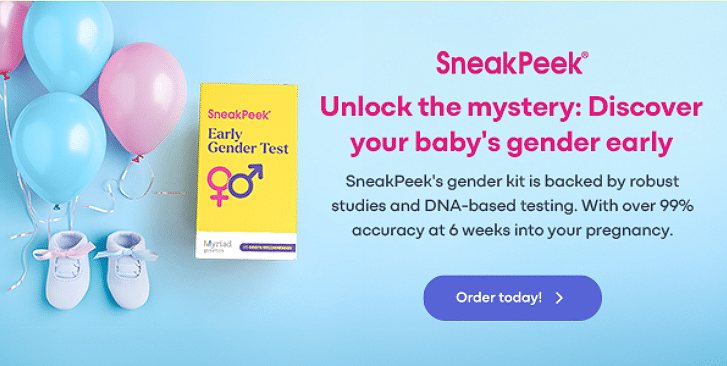Published on June 11th, 2025
Check out SneakPeek Gender Test to find out your baby’s gender as early as 6 weeks with over 99% accuracy!

You’ve just confirmed your pregnancy, and now you’re using your new favorite word—“hic”—about as frequently as a punctuation mark.
But are hiccups a symptom of pregnancy?
In a word, no. Hiccups aren’t considered a sign of pregnancy, early or not. That said, many people are tipped off to a budding pregnancy due to subtle (or sometimes very obvious) changes in digestion, and hiccups can incidentally be a part of that picture.
Although hiccups can be aggravating, the good news is they’re highly unlikely to harm your baby. But if you’re looking for relief—and an explanation as to why they’re happening—keep reading. Below, we’re diving into the science behind hiccups during pregnancy.
First things first: What are hiccups?
Hiccups: You know ‘em when you see ‘em, hear ‘em, and feel ‘em. But what exactly are they?
Put simply, hiccups (technically known as singultus) occur when your diaphragm, the muscle that runs beneath your lungs, involuntarily contracts. When this happens, it causes your vocal cords to abruptly close—resulting in that adorable (and incredibly frustrating) “hic” sound.
Hiccups have numerous common causes, physical and otherwise. These can include:
- Eating too fast
- Drinking bubbly beverages
- Eating spicy foods
- Eating acid-heavy foods
- Swallowing too much air when eating, laughing, or talking
- Being surprised
- Feeling excited
- Feeling stressed out
Cases of hiccups typically resolve on their own, though timelines vary. The good news is that most of the time, hiccups are completely normal and aren’t cause for medical concern, including when you’re pregnant.
Are hiccups a sign of pregnancy?
In a word, no. But while hiccups aren’t considered a pregnancy symptom—early on or not—it’s certainly possible that pregnancy-related shifts could be contributing to the phenomenon.
The most likely contributors are:
- Hormonal changes – Most pregnancy symptoms ultimately stem from the massive hormonal shifts occurring in the first trimester. For instance, progesterone skyrockets in early pregnancy, and one of the physical systems it hits the hardest is your digestive system.
- Indigestion or gas – Progesterone tends to stall digestion, which can lead to a host of side effects. Bloating, acid reflux, indigestion, and excess gas can all contribute to hiccups.
- Changes in respiration – Further into pregnancy, your growing uterus can put more pressure on your diaphragm. This can cause changes in your breathing patterns, which may make it more likely for you to get the hiccups while pregnant.
- Heightened sensitivity – Many people find they’re more vulnerable to common hiccup triggers in early pregnancy. These triggers can include consuming carbonated beverages or eating too quickly. It can help to take note of which foods and drinks are triggering your hiccups and avoid them if they’re bothering you.
Other Signs of Early Pregnancy
While the answer to “are hiccups an early sign of pregnancy” is no, it’s worth knowing some other signs and symptoms of early pregnancy. The most common first-trimester pregnancy symptoms include:
- Nausea (with or without vomiting)
- Indigestion or upset stomach
- Changes in bowel movements
- Constipation
- Heartburn or acid reflux
- Headaches
- Food aversions or cravings
- Changes to breasts
- Fatigue
- Mood swings
- Frequent urination
Do I need to worry about hiccups while I’m pregnant?
It’s very unlikely. Getting hiccups every so often is harmless. However, it’s best to reach out to a healthcare provider if you experience:
- Periods of hiccuping that last more than a day
- Frequent bouts of hiccups that disrupt your day or cause you undue distress
- Chest pain, difficulty breathing, or severe nausea
In some cases, hiccups could stem from a more persistent digestive issue, which is best addressed in partnership with your doctor.
Hold the phone—do babies hiccup in the womb?
Funnily enough, even babies experience hiccups in utero, which are sometimes confused for fetal kicking. It’s most common to feel these in your second and third trimesters, though some parents can sense fetal hiccups even earlier.
While this can be a shock to expecting or first-time parents, it’s thought that fetal hiccuping is a normal part of respiratory development. Generally, fetal hiccups are considered a positive indicator that lung maturation is well underway.
If you notice that your baby hiccups, frequently or without cessation later in pregnancy, it’s a good idea to touch base with your healthcare provider for a check-up.
How to Deal with Hiccups During Pregnancy
If you’re struggling with frequent bouts of hiccups during pregnancy, try some of these hiccup hacks to reduce your hiccup frequency (or get your current case to go away).
Chew Food More Slowly
Certain eating patterns may cause you to swallow more air than necessary. For example:
- Taking big bites of food
- Not fully chewing food before you swallow it
- Eating large amounts of food in one sitting
Consciously taking truly bite-sized bites, completely chewing your food so it’s easier to digest, and eating smaller, more frequent meals are all changes you can make to help reduce the likelihood of hiccups. (Interestingly, they say chewing food 32 times, minimum, is ideal for optimal digestion!)
Straighten Your Posture
Simply sitting up straighter while you eat may take some of the pressure off your diaphragm, helping it relax. This can make both breathing and digestion easier.
Avoid Greasy, Fatty, or Spicy Foods
While it’s more than okay to indulge in these types of food from time to time, greasy, oily, salty, or fatty foods are a common culprit of heartburn and acid reflux—and resultant hiccups. So, it may be worth limiting or avoiding these foods if you notice an increase in hiccups after eating them.
Avoid Bubbly Beverages
An obvious observation, but worth repeating: Carbonated drinks add more air and gas to your digestive tract, which can increase your chances of getting hiccups. The takeaway? Avoiding bubbles can help you avoid hiccups.
Try an Elevated Pillow
If you’re contending with hiccups alongside other digestive symptoms like heartburn, changing your sleep position might help. Many people experience exaggerated acid reflux in a horizontal position, so by propping up your head with a wedge or other firm-style pillow, you may find your symptoms lift.
Try These Other Hiccup-Stopping Hacks
Still debating the efficacy of scaring yourself, standing on your head, and other hiccup-dispelling methods you may have employed in grade school? Then it may be time to give these sometimes-effective hiccup hacks a try, pregnant or not:
- Breath retention – Try holding your breath for 10 to 20 seconds. Sometimes, this can help your diaphragm reset and return to normal breathing patterns.
- Taking small sips of cold water – Sometimes, taking small sips of water during a hiccup attack can help soothe your diaphragm. Cold water may work to help relax your vagus nerve, which is linked to your diaphragm, helping to steady your breathing.
- Massaging your neck – The carotid artery runs along both sides of your neck, and massaging it may help stimulate your vagus nerve. To do so safely, lie down and gently massage the right side of your neck in a circular motion for 5 to 10 seconds, breathing deeply.
If all else fails, it might help to ask a friend, family member, or partner to pat you on the back, effectively burping you (and giving you a little sneak peek of what’s to come once your baby is born).
More Tips for Managing Digestive Discomfort in Pregnancy
Hiccups are just one of many digestive issues that parents-to-be may confront along the road of pregnancy. Fortunately, making small changes in your daily habits can help you find relief. Consider some of the following easy-to-implement tips:
- Level up your hydration – Keeping up with your fluid intake can help reduce bloating and keep digestion moving smoothly.
- Eat more fibrous foods – Fiber-rich foods like whole grains, starchy vegetables, and fruits can help your bowel movements stay regular.
- Try gentle movement after meals – A 20-minute walk or even some mild stretching after meals can help encourage digestion, circulation, and healthy respiration patterns.
- Avoid lying down after eating – As mentioned, the horizontal position can be aggravating to those with digestive discomfort or heartburn. As a result, lying down after eating falls on the list of things to avoid during early pregnancy, especially if you struggle with digestion. When possible, try to stay upright (even if you don’t go for that post-meal walk) after eating.
- Try pregnancy-safe antacids – If your doctor gives you the green light, an antacid may help you find relief from acid reflux, hiccups, and the like. Just be sure to get your provider’s recommendation to find one that suits you and your growing baby.
Take a Smooth Ride Into Pregnancy with the SneakPeek® Test
SneakPeek is on board for every if, and, or “hic!” on the road to parenthood. From your preconception checkup to your first signs of pregnancy and beyond, you can discover products and tips to guide you every step of the way.
Just beginning your journey? With the SneakPeek Early Gender Test, expecting parents can learn their baby’s sex as early as 6 weeks into gestation—weeks before with over 99% clinically proven accuracy.
More than 1 million parents have used the SneakPeek test to break the news of their future baby’s sex sooner than ever. Find out why the SneakPeek test is the #1 OBGYN-recommended at-home early gender test by ordering yours today.
Editorial Policy
At SneakPeek, our commitment is to provide accurate, up-to-date, and reliable information to empower our readers. Our content is thoroughly researched, reviewed by medical experts, and fact-checked to ensure its credibility. We prioritize the well-being and education of our readers, and our editorial policy adheres to the highest standards of integrity and accuracy in all our articles.
This post has been reviewed for accuracy by:
Sarah Cacia, currently leading as the Director of Business Development at Gateway Genomics, parent company of SneakPeek, brings an impressive blend of bioengineering expertise and clinical business acumen. Her extensive experience, marked by roles at renowned institutions like Genentech and UC San Diego's Cardiac Mechanics Research Group, underpins her deep understanding of biotechnology and clinical research. A UC San Diego alumna with a Bachelor of Science in Bioengineering: BioSystems, Sarah's rich professional background empowers her to provide authoritative insights into the cutting-edge developments in the field.
Sources:
- Parents. 16 Very Early Signs of Pregnancy. https://www.parents.com/pregnancy/signs/symptoms/signs-you-may-be-pregnant/
- Parents. What Do Fetal Hiccups Feel Like? https://www.parents.com/baby-hiccups-in-the-womb-8630924
- UT Southwestern Medical Center. 4 common pregnancy-related GI issues, and when to call the doctor. https://utswmed.org/medblog/4-common-pregnancy-related-gi-issues-and-when-call-doctor/
- Mayo Clinic. 1st trimester pregnancy: What to expect. https://www.mayoclinic.org/healthy-lifestyle/pregnancy-week-by-week/in-depth/pregnancy/art-20047208
- Healthline. Chewing Your Food: Is 32 Really the Magic Number? https://www.healthline.com/health/how-many-times-should-you-chew-your-food#how-many-times-to-chew
- Healthline. How to Get Rid of Hiccups. https://www.healthline.com/health/how-to-get-rid-of-hiccups
- Mayo Clinic. Hiccups. https://www.mayoclinic.org/diseases-conditions/hiccups/symptoms-causes/syc-20352613
- Healthline. My Baby Hiccups in the Womb: Is This Normal? https://www.healthline.com/health/pregnancy/baby-hiccups-in-womb#should-you-be-concerned








